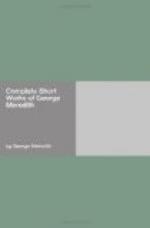Fielding’s Jonathan Wild presents a case of this peculiar distinction, when that man of eminent greatness remarks upon the unfairness of a trial in which the condemnation has been brought about by twelve men of the opposite party; for it is not satiric, it is not humorous; yet it is immensely comic to hear a guilty villain protesting that his own ‘party’ should have a voice in the Law. It opens an avenue into villains’ ratiocination. {9} And the Comic is not cancelled though we should suppose Jonathan to be giving play to his humour. I may have dreamed this or had it suggested to me, for on referring to Jonathan Wild, I do not find it.
Apply the case to the man of deep wit, who is ever certain of his condemnation by the opposite party, and then it ceases to be comic, and will be satiric.
The look of Fielding upon Richardson is essentially comic. His method of correcting the sentimental writer is a mixture of the comic and the humorous. Parson Adams is a creation of humour. But both the conception and the presentation of Alceste and of Tartuffe, of Celimene and Philaminte, are purely comic, addressed to the intellect: there is no humour in them, and they refresh the intellect they quicken to detect their comedy, by force of the contrast they offer between themselves and the wiser world about them; that is to say, society, or that assemblage of minds whereof the Comic spirit has its origin.
Byron had splendid powers of humour, and the most poetic satire that we have example of, fusing at times to hard irony. He had no strong comic sense, or he would not have taken an anti-social position, which is directly opposed to the Comic; and in his philosophy, judged by philosophers, he is a comic figure, by reason of this deficiency. ’So bald er philosophirt ist er ein Kind,’ Goethe says of him. Carlyle sees him in this comic light, treats him in the humorous manner.
The Satirist is a moral agent, often a social scavenger, working on a storage of bile.
The Ironeist is one thing or another, according to his caprice. Irony is the humour of satire; it may be savage as in Swift, with a moral object, or sedate, as in Gibbon, with a malicious. The foppish irony fretting to be seen, and the irony which leers, that you shall not mistake its intention, are failures in satiric effort pretending to the treasures of ambiguity.
The Humourist of mean order is a refreshing laugher, giving tone to the feelings and sometimes allowing the feelings to be too much for him. But the humourist of high has an embrace of contrasts beyond the scope of the Comic poet.
Heart and mind laugh out at Don Quixote, and still you brood on him. The juxtaposition of the knight and squire is a Comic conception, the opposition of their natures most humorous. They are as different as the two hemispheres in the time of Columbus, yet they touch and are bound in one by laughter. The knight’s great aims and constant mishaps, his chivalrous valiancy exercised on absurd objects, his good sense along the highroad of the craziest of expeditions; the compassion he plucks out of derision, and the admirable figure he preserves while stalking through the frantically grotesque and burlesque assailing him, are in the loftiest moods of humour, fusing the Tragic sentiment with the Comic narrative.




